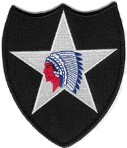
U.S. 2nd Infantry Division (2ID)
World War Two
(A tribute to our brave combat veterans)
by
Kraig J. Rice
www.7-star-admiral.com
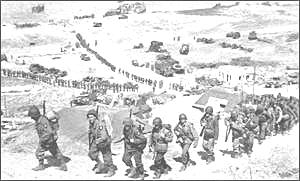

U.S. 2nd Infantry Division (2ID)
World War Two
(A tribute to our brave combat veterans)
by
Kraig J. Rice
www.7-star-admiral.com

The division landed on Omaha Beach on D-Day + 1 (June 7, 1944) in Normandy, France. The 2ID was part of General Omar Bradley's First Army. Our brave men fought their way across Europe and were in Pilsen, Czechoslovakia, when the war against Germany was over with on May 8, 1945.
WORLD WAR II (1941 – 1945) Battle Legacy:
THE EUROPEAN THEATER OF OPERATIONS:
As part of the build up for operation Overload, the Normandy invasion, the 2d Infantry Division was transferred from fort Sam Houston to Ireland in October, 1943. There it spent ten months undergoing extensive training. On 7 June, 1944, D-Day + 1, the division stormed ashore at bloody Omaha Beach. While other units were stalled by the determined German resistance to the west, the Indianheads blasted through the hedgerows of Normandy. After fierce, 39-day battle, the 2d Division, fighting in the streets and alleyways, finally took their objective as the vital port city of Brest, which was liberated on 18 September, 1944. Once mop up operations were complete in the Normandy region, the division turned west and plunged headlong across France. From positions around St. Vith, Belgium, the Second was ordered, on 11 December, 1944, to attack and seize the Roer River dams. Having pierced the dreaded Siegfried Line, the division was advancing when Nazi Field Marshal Gerd Von Rundstedt unleashed a powerful
German offensive in the Ardennes. Throughout this Battle of the Bulge the 2d Infantry Division held fast, preventing the enemy from seizing key roads leading to the cities of Liege and Antwerp.
Resuming the offensive on 6 February, 1945, the division joined the race to annihilate the fleeing Wehrmacht. Transferred from the First Army to Patton’s Third Army, the Indianheads spent their last days of the European War in a dash across Czechoslovakia, finally halting in the town of Pilsen. This city became a meeting point between invading armies from east and from west. It was in Pilsen that the soldiers of the 2nd Infantry Division first met their Soviet allies who represented the forces of communism that they would face so often in the future, no longer as allies.
Division Order of Battle in WW II:
The division participated in the Normandy, Northern France, the Rhineland, Ardennes-Alsace, and the Central Europe Campaigns of World War Two. The Division suffered 3,031 killed in action and 12,785 wounded in action during the war.
The Second Infantry Division arrived back home at Ft. Swift, Texas on July 22, 1945.
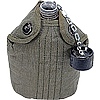
9th Infantry Regiment 23rd Infantry Regiment
38th Infantry Regiment
Headquarters and Headquarters Battery,
2nd Infantry Division Artillery
12th Field Artillery Battalion (155 Mm) 15th Field Artillery Battalion (105 Mm)
37th Field Artillery Battalion (105 Mm) 38th Field Artillery Battalion (105 Mm)
2nd Engineer Combat Battalion 2nd Medical Battalion
Headquarters Special Troops, Headquarters Company,
2nd Infantry Division 2nd Infantry Division
702nd Ordnance Company 2nd Quartermaster Company
2nd Reconnaissance Troop 2nd Signal Company
2nd Military Police Platoon 2nd Infantry Division Band
Headquarters 2nd Infantry Division
Units Attached Throughout Combat:
612th Tank Destroyer Battalion 741st Tank Battalion
462nd Anti-Aircraft Artillery Battalion 2nd Counterintelligence Corps Detachment
Photo Interpretation Team No. 6 Order Of Battle Team No. 8
Military Intelligence Interpreter Team
No. 415
Interrogation Prisoner of War Team No. 25
Interrogation Prisoner of War Team No. 27 Interrogation Prisoner of War Team No. 28
Detachment "I", 165th Signal Photo Company Air Support Party, IX Tactical Air Command

Note: my father, Staff Sergeant Hanford Maurice Rice, was in Charlie Company (First Battalion) of the U.S. 9th Infantry Regiment (9IR) during World War Two. He wrote a diary of his experiences that I share online as well as some divisional and regimental history that I have copied from the official histories:

The U.S. 2nd Division had 2 booklets printed during World War 2
D+1 to D+105
D+106 to VE Day
Note: I quote this division history D+1 to D+105 in the above mentioned diary of
Sergeant Rice. I quote it in blue print. Just click on the photo of the cover to go there.
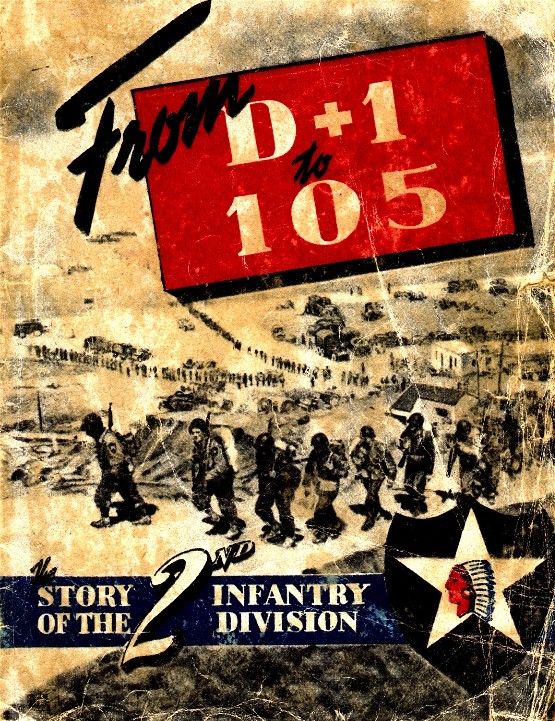 *
*
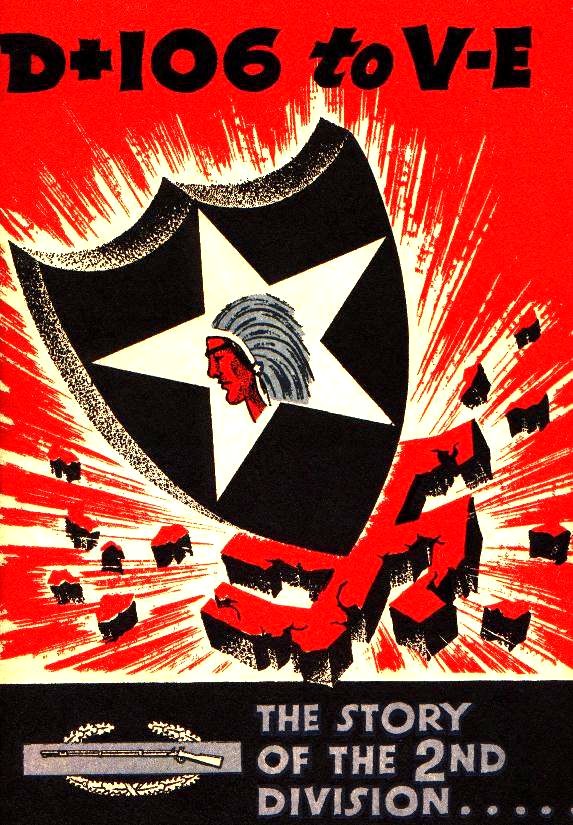
There were 3 infantry regiments assigned to the 2ID during World War 2:
If you desire to purchase any cloth patches of the U.S. 9th Infantry Regiment you can contact the 9th Infantry (Manchu) Regiment Association. They also have belt buckles and decals and other cool stuff for sale. You can find them at:
The U.S. 9th Infantry Regiment (9IR)
The U.S. 23rd Infantry Regiment (23IR)
The U.S. 38th Infantry Regiment (38IR)
http://www.manchu.org/regiment/association.htm
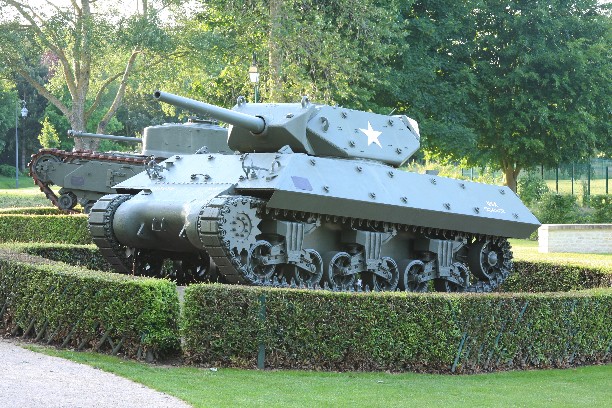
2ID WW2 books for you to purchase from independent sources:
The Combat History of the Second Infantry Division In World War II
Keep Up the Fire- The Ninth Infantry Regiment in WWII
War by Floyd Kornegay
My Generation by Fred Howland
How A Ninety-Day Wonder Survived the War by Charlie Curly
741st Tank Battalion by Al Heintzleman
Battleground by John Toland (printed in 1959)
Company Commander by Charles B. MacDonald
The Battle of the Bulge: The Losheim Gap Doorway to the Meuse by Hans J. Wijers
The Battle of the Bulge: Seize the Bridges by Hans J. Wijers and Elmer S. McKay
In Death's Dark Shadow - A Soldier's Story by Cleve Barkley
Reprinted by the Battery Press, Nashville, Tenn., 1979 (No copyright)
Written by Al Castillo
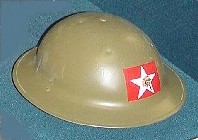
Shipped to Europe as a replacement, he took command of Company I, 23rd Infantry in early September of 1944. He was in command of Company I in an action during the Battle of the Bulge in which the 3rd Battalion received the Presidential Unit Citation.
U.S. Troops Block Northern German Advances December 1944 (Paperback - 2001)
Comments: An exceptional self-published history of the American actions blocking the German army's northward advance in the Battle of the Bulge;
interesting interviews on the Malmedy Massacre (Paperback - 2005)
(2nd Battalion of the 38th Infantry Regiment)

Note: there was a black and white movie produced in 1950 titled Breakthrough that
highlighted the U.S. infantryman's fight through the Normany hedgerows shortly
after D-Day. It stared the U.S. first infantry division- that division was on the left
flank of our second division at that time in Normandy. I mention this so you can have
an opportunity to see what hedgerow fighting was like in Normandy at that time. It stars
David Brian, John Agar, and Frank Lovejoy. I know
my father hated fighting in those hedgerows and talked about them much of the time
after the war. I have this movie on dvd and I recommend that you purchase it from
someone who has it for sale. It is a part of the Warner Brothers archive collection.

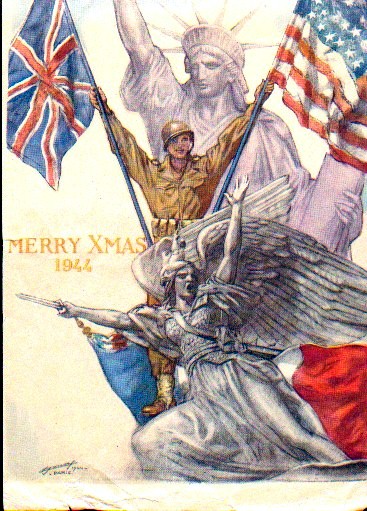
|

